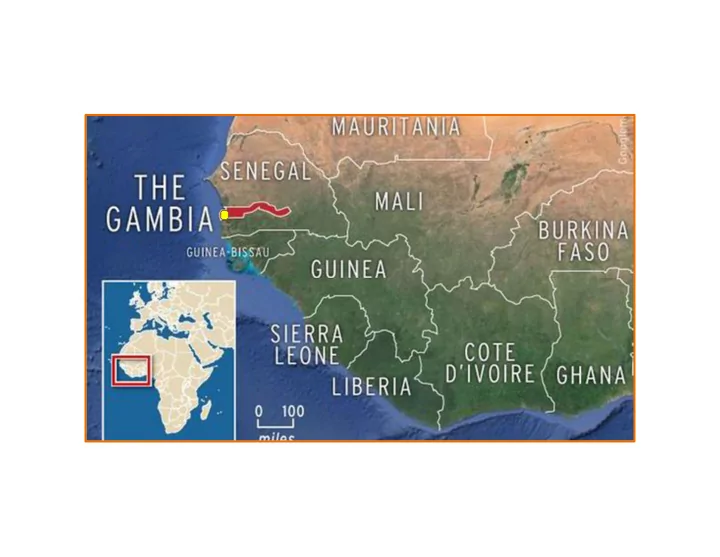

Health System Strengthening Through Worker Protection in The Gambia Led by Drs. Melissa McDiarmid & Joanna Gaitens, School of Medicine
Why Occupational Health & Safety (OHS)? • Healthcare is a high-hazard industry and/but without the healthcare workers, the system falls apart • The Gambia o Lessons from Ebola epidemic o OHS concerns exacerbated in resource-poor settings Biologic: need-stick injuries, TB exposure Psychological: promoting a “no-blame” culture • Our Project: OHS training for healthcare workers o Groundwork done by Dr. McDiarmid in 2014
Nicole Campion Dialo (SOM), Dr. Melissa McDiarmid (SOM), Sarah Gregorini (SSW), Dr. Joanna Gaitens (SOM), Wesley Chan (SOM), Alyssa Riuli (SOD)
Who was involved? • Partners University of the Gambia School of Medicine & Allied Health o Sciences Gambian Ministry of Health o Edward Francis Small Teaching Hospital (EFSTH) o • Attendees Clinicians o Regional & local public-health officers o
What did we do? • 3-day training at EFSTH • “Train-the-trainer” Lectures on minimizing risk of exposure to bloodborne & airborne o pathogens Small-group case studies o Facility walk-through exercise o • Sustainability plan: next meeting was scheduled before we left
Collegiality Collaboration
Occupational Health and Safety Dashboard • Assessment tool • Evaluate healthcare facility Organization, Infection Control, o Training, etc. • Provides a rough idea of the status of the healthcare facility and potential improvement areas
Infection Control • Is there a policy requiring workers to wash hands before caring for patients? 53% Yes 41% No 6% Don’t know • Do patient care areas have sinks readily available ? 71% Yes 18% No 12% Don’t know • Are antiseptic soap, water and towels available ? 82% Yes 6% No 12% Don’t know
Infection Control • “ Not all areas have sinks readily available” • “We have sinks but not enough ” • “Antiseptic soap, water and towels are only sometime available ” –Their availability is not continuous
Protection from Blood and Body Fluids • Is there a blood and body fluids exposure policy to protect workers? 39% Yes 44% No 17% Don’t know • Is there a policy requiring use of sharp devices that have safety features ? 39% Yes 44% No 17% Don’t know • Are sharps disposal containers available in all patient care areas? 73% Yes 20% No 7% Don’t know
Employee Training/Record Keeping • In response to "Is a blame free environment promoted to encourage reporting of exposures and incidents"- "Somehow, no one is prevented to report an incident"
Dashboard Summary • Great tool to focus training and discussion • Provided a snapshot of the overall Gambian healthsystem. o Both to our team and to other Gambian health officials
Small Group Discussion ● Discussed scenarios about TB exposure and needlestick injuries ● Allowed for application of training material ● Helped our team and participants prepare for the walk-through
Facility Walk-through
Workplace Inspection Tool* • General Physical Environment • Pharmacy • Laboratory • Patient Care Unit • Central Sterilization Unit *Modified from Workplace Inspection Tool for Pelonomi Hospital September 2007- Developed by Annlee Yassi and Elizabeth Bryce
Laboratory Item/Description Comments 1. Equipment · The equipment in the Biochemistry Lab appeared to be in good working condition, although dust was a. Automated equipment clean and well maintained noted on the tops of several machines. · The Microbiology Lab had a fume hood of an unknown type. However, one employee said it was not b. Biosafety and/or chemical containment cabinets present and regularly inspected regularly inspected. · There were no splashguards present in any visited laboratories. d. Splashguards in place where specimens are opened · There were many free-standing (i.e. not secured) compressed gas cylinders between patient beds, which e. Compressed gases (e.g., O 2, N2O) chained in place, regularly inspected, and maintained could injure staff or patient if they fell. There was a reported case of a falling canister where the canister neck was broken at this facility. In addition, empty canisters were left free-standing outside. · In all areas observed, no single-use supplies and equipment were reused. f. Equipment and supplies designated as single use not reused (e.g., blood tubes, syringes). · Fire extinguishers were available in rooms, however several were not properly fastened to the wall. g. Fire extinguishers available · There were no specific eye wash stations. h. Eye wash facilities available
Assessments and Recommendations • Waste Disposal • Needlestick Injury and other blood/ bodystick injuries • Sharps • Compressed Gas Canisters • Fire Extinguishers • Chemical Storage • Chemotherapy Drugs
Acknowledgements • Dr. William (Bill) Roberts • Dr. Ousman Nyan and his staff • Dr. Samba Ceesay, Mr. Janko Jimbara and Mr. Bolong Jobarteh and other Members of the Ministry of Health • Dr. M.I.A. Kahlil, Edward Francis Small Teaching Hospital • Mr. Gibril Sumbunu • Mr. Baboucarr Jallow, Mr. Omar Gaye, and Ms. Yamai Secka Jack • UMB Center for Global Education Initiatives
Questions?
Recommend
More recommend